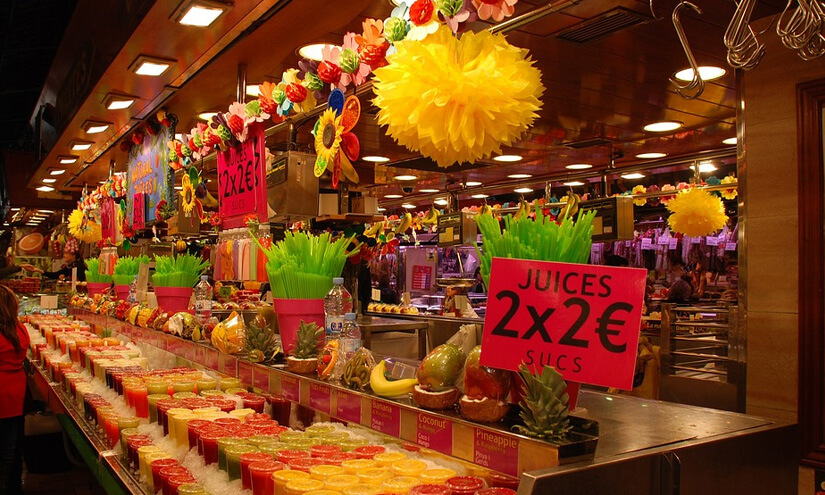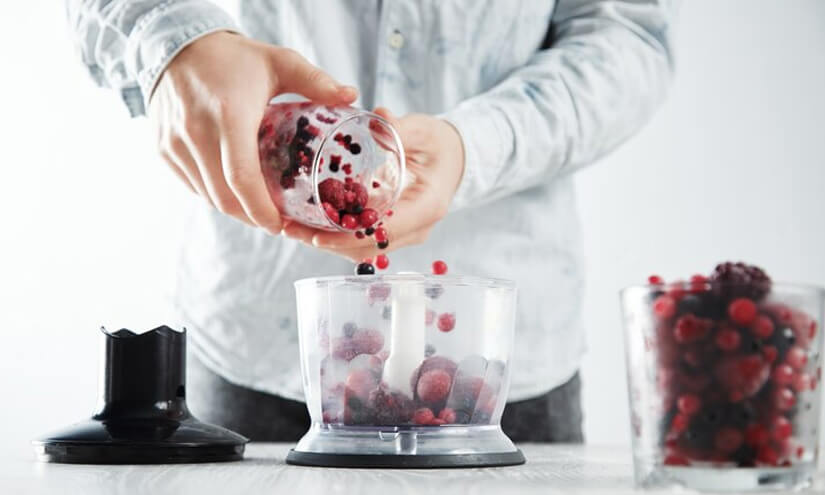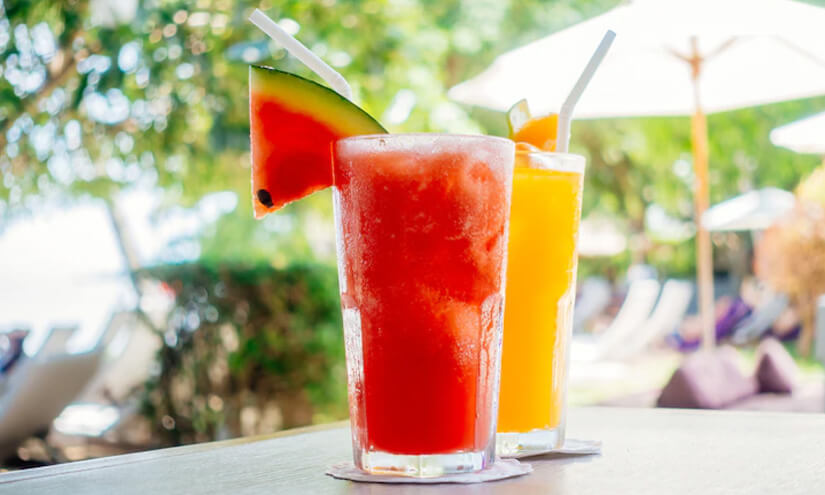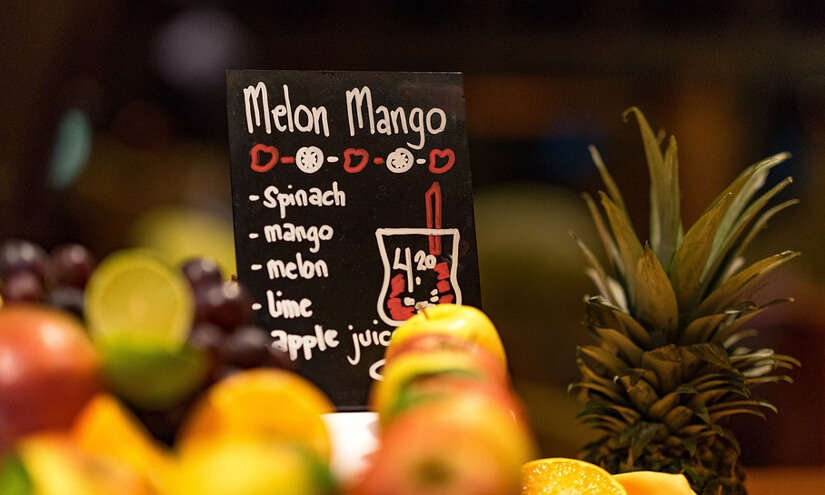Do you have these questions in your mind?
- What is the Juice Bar Business?
- How to start a Juice Bar Business?
- How much does it cost to start a Juice Bar Business?
- How to find the best location to open a Juice Bar Business?
In this article, you will find answers to all your questions. So please grab a cup of coffee, and let’s get started.
Table of Contents
What is the Juice Bar Business?
With a global market value of around USD 15.69 billion and a CAGR of 8.7% from 2021 to 2028. The Juice Bar Industry is one of the biggest industries in the world right now.
Juice Bar is a type of food and beverage business specializing in serving freshly made juices, smoothies, and other health-focused beverages.
Juice Bars offer a variety of fruit and vegetable-based drinks, often made-to-order or from pre-set recipes, focusing on freshness, natural ingredients, and health benefits.
The Juice Bar industry has gained popularity due to increasing consumer demand for healthier options and offers convenient, accessible, and refreshing beverages promoting a healthy lifestyle.
Business models can vary, and successful Juice Bars require careful planning, market research, quality ingredients, food safety compliance, and effective marketing strategies.
By the end of this article, you’ll learn the steps you need to take to start your very own Juice Bar and the critical considerations for making it a success.
Market Insight: In the US, the Juice market Industry reached a staggering market value of $3.9 Billion, while in the Uk its around £286 Million.

Types of Juice Bar Businesses
There are various types of juice bar businesses, ranging from small-scale juice bars to more extensive franchise operations.
However, here are some common types:
- Stand-alone juice bar:
This small-scale, independent juice bar operates as a single location. It may be a locally owned and operated business, often serving freshly squeezed juices, smoothies, other healthy beverages, and some food options.
- Smoothie bar:
These juice bars focus on smoothies made from blended fruits, vegetables, and other healthy ingredients. They may also offer beverages such as juices, protein shakes, and wellness shots.
- Organic juice bar:
These juice bars use organic ingredients, which are grown without synthetic fertilizers, pesticides, or genetically modified organisms (GMOs). They cater to health-conscious customers who prefer organic produce for their juices and smoothies.
- Cold-pressed juice bar:
Cold-pressed juice bars use a specialized juicing process that extracts juice from fruits and vegetables without applying heat, which helps to retain more nutrients and enzymes. Cold-pressed juice bars may offer other beverages like nut milk, detox cleanses, and wellness shots.
- Vegan juice bar:
These juice bars focus on offering plant-based juices, smoothies, and other beverages, catering to customers who follow a vegan or vegetarian lifestyle. They may also provide vegan snacks or light meals to complement their drinks.
- Franchise juice bar:
These are juice bar businesses that operate under a franchise model. A parent company owns the brand and business model, and individual franchisees operate multiple locations under the same brand.
- Mobile juice bar:
These juice bars operate out of mobile units, such as food trucks, carts, or pop-up stands, which can be moved to different locations based on demand. Mobile juice bars are famous for events, festivals, and markets and offer convenience and flexibility in reaching customers.
- Specialty juice bar:
These juice bars focus on a specific niche or specialty, such as detox juices, immunity-boosting juices, or juices for particular health conditions. They cater to customers with specific health goals or dietary preferences.
- Juice bars with additional services:
Some juice bars may offer additional services such as wellness consultations, nutritional coaching, or other wellness-related services in addition to their beverage offerings. This allows them to provide a holistic approach to health and wellness.
These are just a few examples of the different types of juice bar businesses. In addition, juice bars can vary in size, menu offerings, pricing, location, and target market, depending on the specific business model and concept.
Remember, as a startup, your goal should be to keep your costs low and depend on your skills. If you push the process and try to go full-service from the very beginning, there is a good possibility that you’ll be overburdened and may get lost in the process.

Pros and Cons of a Juice Bar Business
Pros of a Juice Bar Business:
- Health-conscious demand.
- Repeat business.
- Customization and creativity in menu offerings.
- Potential for high profit margins.
- Opportunity for expansion and growth.
Cons of a Juice Bar Business:
- Seasonal fluctuations in demand for certain ingredients.
- High competition in the health and wellness industry.
- Need for frequent ingredient sourcing and inventory management.
- Equipment and operational costs.
- Potential health and safety regulations and compliance requirements.

How much investment is required for your Juice Bar Business?
The investment required to start a Juice Bar business in the UK & the US can vary depending on many factors, such as the size and location of the company, the type of equipment and supplies needed, and the labor cost.
The average cost to open a small Juice Bar Business in the US ranges from $50K – $500K. While in the UK, the average cost to open a small Juice Bar ranges from £50K to £200K.
Some Common Expenses of running a Juice Bar Business include:
- Rent or mortgage payments for the building or space
- Equipment and supplies
- Ingredients
- Employee wages and benefits
- Insurance
- Marketing and advertising
- Maintenance and repairs for equipment and the building
- Utilities such as electricity, water, and internet
- Point of sale systems and software
- Professional services such as accounting and legal fees

How much will you earn in a Juice Bar business?
It is easier to estimate earnings of a Juice Bar with more information about the specific company, such as location, target market, and competition. In addition, factors such as overhead costs, sales volume, and pricing will all play a role in determining your earnings.
The average US Juice Bar revenue is around $50K – $100K annually, while in the UK it’s around £25K – £75K per year, with a profit margin of about 15% – 25%.
Busiest time for your business:
The busiest seasons for a juice bar business typically align with warmer weather, such as spring and summer, when people are more inclined to seek refreshing and hydrating beverages like juices and smoothies. During these seasons, customer demand for healthy and refreshing drinks increases, making it a peak time for juice bar businesses to thrive. However, the specific busy season may also vary depending on the location, climate, and local factors.
Looking for LOGO Design + Branding?
iMedia Ad Agency is an award wining Logo Design Company run by Sushant & Vijaya, offering professional logo designs for Start-ups / SMEs / Home Businesses Owners.
WHAT ALL YOU WILL GET IN YOUR LOGO PACKAGE?
- Full ownership of final Logo remains with the client
- 100% original logo artwork
- No internet copy-paste work
- Original sketch supplied
- Super High resolution Vector file formats
- Free 1 month logo backup support
- Telephone, chat, skype & email support
Get all Business Launch Solutions under one roof Logo, Corporate Identity, Invite, Stationary, Packaging, Broucher, Product Display, Web Design, Business Blog, Shopify Store, Startup Pitch Deck, Google SEO, Product Reviews, Business Articles, and Social Media Management.


Types of Juices you can sell in a Juice Bar Business
Here are some examples of Juices you can sell in a Juice Bar Business:
- Green Juices:
Made with leafy greens like kale, spinach, and celery, often mixed with fruits like apples, cucumbers, and pineapples for a refreshing and nutrient-rich beverage.
- Fruit Juices:
Made with various fruits like oranges, strawberries, blueberries, watermelon, and more, offering a wide range of flavors and natural sweetness.
- Citrus Juices:
Made with citrus fruits like oranges, grapefruits, and lemons, known for their tangy flavors and high vitamin C content.
- Tropical Juices:
Made with tropical fruits like mangoes, papayas, coconuts, and passion fruits, offering exotic and tropical flavors.
- Berry Juices:
Made with berries such as strawberries, raspberries, blackberries, and blueberries, known for their antioxidant properties and sweet-tart flavors.
- Vegetable Juices:
Made with a mix of vegetables like carrots, beets, cucumbers, and tomatoes, providing a nutrient-rich and savory option.
- Root Juices:
Made with root vegetables like ginger, turmeric, and beets, known for their anti-inflammatory properties and unique earthy flavors.
- Detox Juices:
Made with ingredients like lemon, ginger, and parsley, designed to cleanse and detoxify the body.
- Protein-packed Juices:
Made with protein-rich ingredients like nuts, seeds, and plant-based protein powders, providing a satisfying and nourishing beverage.
- Customized Juices:
Customers can create unique juice blends by selecting their preferred fruits, vegetables, and add-ons based on their taste preferences and dietary needs.
A typical day in a Juice Bar business includes:
1. Opening the business
2. Preparing of the juice and all the other ingredients
3. Serving customers
4. Managing inventory
5. Cleaning
6. Closing the cafe
7. Paper work and administrative tasks
8. Maintenance

Juice Bar Menu!
Here’s a list of possible items you might find on a juice bar menu:
1. Fresh Cold-Pressed Juices:
- Green Machine: Kale, spinach, cucumber, celery, apple, lemon
- Citrus Blast: Orange, grapefruit, lemon, pineapple
- Beet It Up: Beet, carrot, ginger, apple, lemon
- Tropical Paradise: Mango, pineapple, banana, coconut water
2. Smoothies:
- Berry Blast: Mixed berries, banana, Greek yogurt, almond milk
- Peanut Butter Power: Banana, peanut butter, spinach, dates, almond milk
- Mango Tango: Mango, pineapple, Greek yogurt, coconut milk
- Kale-licious: Kale, banana, apple, ginger, almond milk
3. Acai Bowls:
- Classic Acai Bowl: Acai berries, banana, mixed berries, granola, honey
- Tropical Acai Bowl: Acai berries, mango, pineapple, coconut flakes, almond butter
- Berry Bliss Acai Bowl: Acai berries, mixed berries, banana, chia seeds, honey
4. Shots and Boosters:
- Wheatgrass Shot: Freshly juiced wheatgrass
- Ginger Shot: Freshly juiced ginger
- Immunity Booster: Orange, lemon, ginger, turmeric
- Energy Booster: Beet, carrot, apple, ginger
5. Cleansing Programs:
- 1-Day Juice Cleanse: A selection of cold-pressed juices for a full day of cleansing
- 3-Day Juice Cleanse: A variety of cold-pressed juices for three days of cleansing
- Customized Cleansing Programs: Tailored juice cleanse programs based on individual needs and goals
6. Add-ons:
- Nut Butters: Almond butter, peanut butter
- Superfood Add-ons: Chia seeds, flaxseeds, hemp seeds
- Sweeteners: Honey, agave nectar, dates
7. Customized Juice Creations:
- Build Your Own Juice: Choose your own combination of fruits, vegetables, and boosts
- Build Your Own Smoothie: Choose your own combination of fruits, vegetables, and bases (e.g., almond milk, coconut water, Greek yogurt)
Note: The availability of items may vary depending on the specific juice bar and location.
Trends & Challenges in a Juice Bar Business
Trends in a Juice Bar Business
1. Increasing demand for plant-based and vegan juices.
2. The growing popularity of cold-pressed juices
3. Rising demand for customized juice blends.
4. Emphasis on using locally-sourced and organic ingredients.
5. Incorporating functional ingredients such as superfoods, adaptogens, and CBD into juice recipes.
Challenges in a Juice Bar Business
1. Rising competition
2. Fluctuating costs of fresh produce
3. Maintaining consistent quality and taste of juices
4. Managing operational costs, including labor, rent, utilities, and equipment maintenance.
5. Meeting stringent food safety and hygiene regulations, including proper handling of perishable ingredients.

Employees to hire for your Juice Bar Business
When hiring employees for a juice bar business, it’s essential to consider your operation’s specific needs and requirements.
Some key roles that may be essential for a juice bar business include:
- Juice Baristas:
These employees will prepare and serve the juices, smoothies, and other beverages. They should know ingredients, recipes, and food safety regulations well.
- Customer Service Representatives:
Friendly and knowledgeable customer service representatives can help provide excellent service to customers, take orders, handle inquiries, and manage the point of sale (POS) system.
- Kitchen Staff:
Depending on the size and scope of your juice bar, you may need kitchen staff to handle food preparation, such as washing, cutting, and measuring ingredients, as well as maintaining cleanliness and food safety standards.
- Cleaning and Maintenance Staff:
Keeping a juice bar clean and well-maintained is crucial for food safety and customer satisfaction. Hiring cleaning and maintenance staff can help ensure that your juice bar is always in top-notch condition.
- Manager or Supervisor:
If you have a more extensive operation, hiring a manager or supervisor can help oversee day-to-day operations, manage staff, handle inventory and order, and ensure smooth operations.
- Marketing and Social Media Staff:
In today’s digital age, having a solid online presence and marketing strategy is essential for any business. Hiring employees with expertise in marketing and social media can help promote your juice bar and attract more customers.
It’s essential to consider your juice bar business’s specific needs and hire skilled, reliable employees aligned with your business goals and values. Proper training and ongoing supervision can also help ensure your employees deliver excellent customer service and maintain food safety standards.
TIP: People like coming to clean & hygienic places, keep premises neat & clean. If you are operating from home or counter-selling, make the area clean & safe. Unhygienic products can make your customers fall ill. It will again make you lose your customers.

Licences needed for a Juice Bar
The specific licenses needed for a juice bar business in the UK and US can vary depending on the location and local regulations. However, here are some standard licenses and permits that may be required:
United Kingdom (UK):
- Business License:
You may need a general business license from the local council or government authority to operate your juice bar in the UK.
- Food Business Registration:
If you are handling, preparing, or selling food and beverages, you will likely need to register your juice bar as a food business with the local environmental health department.
- Food Hygiene Rating:
In the UK, businesses that handle food and beverages, including juice bars, are typically assigned a Food Hygiene Rating by the local council or environmental health department, which may require an inspection and compliance with food safety regulations.
United States (US):
- Business License:
You may need a general business license from the local government or county/city authorities to operate your juice bar in the US. Requirements may vary by state and municipality.
- Food Service Permit:
Most states in the US require a food service permit or license for businesses that handle, prepare, or serve food and beverages, including juice bars. The local health department or a related agency typically issues these permits.
- Seller’s Permit:
If you plan to sell taxable goods or beverages, including juices and smoothies, you may need to obtain a seller’s permit from the US state or local tax agency to collect and remit sales taxes.
It’s essential to research and comply with the specific licensing requirements in your local area and consult with relevant authorities or professionals to ensure that your juice bar business operates legally and in compliance with local regulations.
Some tips to help your Juice Bar grow:
1. Offer unique and creative juice blends to stand out from competitors.
2. Create an appealing and inviting juice bar atmosphere
3. Utilize social media and online marketing
4. Offer loyalty programs or incentives to encourage repeat business.
5. Collaborate with local fitness studios, health clubs, or wellness events for cross-promotion.
6. Provide excellent customer service and prioritize customer satisfaction.
7. Use high-quality, fresh ingredients
8. Stay updated with health and wellness trends.

FREE DOWNLOAD
Launch your Money Blog
Build a 24/7 money machine that you can create and grow from anywhere in the world you are…

Find a good location for your Juice Bar Business!
Tips on finding a good location for your Juice Bar :
- Conduct thorough market research to identify areas with high foot traffic, health-conscious demographics, and potential demand for a juice bar.
- Consider accessibility and visibility of the location, such as proximity to busy streets, public transportation, and parking options.
- Evaluate competition in the area and choose a location with limited or no direct competition.
- Consider the space’s size, layout, and condition to ensure it meets the requirements for a juice bar setup and operations.
- Check local zoning and permit requirements and any restrictions on food and beverage establishments in the area.
- Consider the lease terms, including rent, lease duration, and additional costs or clauses.
- Look for locations with a positive vibe and atmosphere that aligns with the brand and concept of your juice bar.
- Consider the demographics and preferences of your target customers, such as proximity to offices, gyms, or health-focused businesses.
- Evaluate the potential for future growth and expansion opportunities in the chosen location.
- Seek the help of a qualified commercial real estate agent or consultant with experience in the food and beverage industry to assist in finding a suitable location for your juice bar.
A good location will determine whether your business will succeed in the future. A perfect place with your tasty Juice Bar will always bring profits to your business in the future.

Shall I go for a Juice Bar franchise?
Buying an existing Juice Bar Franchise of a recognized brand is a good idea; however, it is expensive also.
On the other hand, the franchisor will benefit you will all the existing brand image, customer loyalty, advertising, market research & strategies.
In addition, you will get guidance from the franchisor about training the workforce & ambiance of the premises.
Some of the top Juice Bar Franchises in the UK and USA:
Top Juice Bar Franchises in the UK:
- Boost Juice
- Crussh
- Joe & The Juice
- Fuel Juice Bar
- JuiceMaste
Top Juice Bar Franchises in the USA:
- Jamba Juice
- Smoothie King
- Robeks
- Tropical Smoothie Cafe
- Nekter Juice Bar
Conclusion
In conclusion, starting a Juice Bar Business in the UK and the US can be rewarding and profitable.
However, conducting thorough market research, creating a solid business plan, and securing the necessary funding is crucial. In addition, it is essential to find the right location, choose the right equipment and suppliers, and create a unique and inviting atmosphere for customers.
Following these steps, you can set your Juice Bar Business up for success and build a business that customers will love for years.

Want to Save Time in your Business Launch?
- How to Create a Business Plan
- What is Market Research, USP, Niche & Positioning
- How to find a suitable name for your business
- How to create your brand image (Logo + Branding)
- How to Register Your Business
- How to Register for Taxes
- How to get Licenses / Permits
- How to Open a Business Bank Account
- How to Get Business Insurance
- Which Payment Processing Terminal (POS) to buy
- How to get Funds for your Business
- How to do Sales & Marketing – Offline & Online
- Why have a Website / Blog / Social Media
- How to build & train your Dream Team
- How to provide Excellent Customer Service
- Buying an Old Business Vs Franchisee Vs Own Brand from Scratch
Handpicked inspirational Youtube videos for you
Juice Bar Business Plan – For Beginners – YT Channel ‘Lauren Mattice’
GENIUS WAY TO LEGALLY START YOUR JUICE BUSINESS FROM HOME – YT Channel ‘Jordan Rosendale’
Top 5 Tips for Starting a Juice Business – YT Channel ‘Cold Pressed Truth’
A. Depending on your location, you may need to obtain various permits and licenses to operate a juice bar business. This may include business licenses, health department permits, food handling permits, and possibly other local, state, or federal permits. It’s important to research and comply with all relevant regulations and obtain the necessary permits and licenses before starting your juice bar business.
A. The amount of capital required to start a juice bar business can vary depending on factors such as location, size, equipment, and staffing requirements. Costs may include lease or purchase of a location, renovation or construction, equipment and supplies, initial inventory, marketing and promotional expenses, and employee wages. Creating a detailed business plan and budgeting for all expenses can help you estimate the capital needed to start your juice bar business.
A. The specific equipment needed for a juice bar can vary depending on the menu and operations, but some common equipment may include commercial juicers, blenders, refrigeration units, sinks, food processors, display cases, and point-of-sale (POS) systems. It’s important to research and invest in high-quality equipment that meets health and safety standards and can effectively handle the demands of your juice bar business.
A. Your juice bar menu should include a variety of healthy and delicious juice and smoothie options that cater to the preferences and dietary needs of your target customers. This may include different types of fruit and vegetable juices, smoothies, acai bowls, protein shakes, and other related items. You may also consider offering additional menu items such as snacks, salads, and health-focused food options to complement your juice offerings.
A. Sourcing fresh and high-quality ingredients is crucial for a juice bar business. You may need to establish relationships with local farmers, wholesalers, or other suppliers to obtain fresh produce, fruits, vegetables, and other ingredients. Consider using organic, locally-sourced, and seasonal ingredients, as they may appeal to health-conscious customers.



















